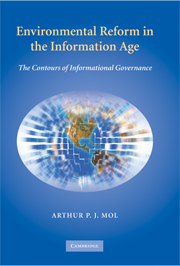Book contents
- Frontmatter
- Contents
- Tables, figures and boxes
- Preface
- Introduction: new frontiers of environmental governance
- Part I Theory
- Part II Praxis
- 5 Monitoring, surveillance and empowerment
- 6 Environmental state and information politics
- 7 Greening the networked economy
- 8 Environmental activism and advocacy
- 9 Media monopolies, digital democracy, cultural clashes
- 10 Information-poor environments: Asian tigers
- Part III Conclusion
- References
- Index
6 - Environmental state and information politics
Published online by Cambridge University Press: 03 November 2009
- Frontmatter
- Contents
- Tables, figures and boxes
- Preface
- Introduction: new frontiers of environmental governance
- Part I Theory
- Part II Praxis
- 5 Monitoring, surveillance and empowerment
- 6 Environmental state and information politics
- 7 Greening the networked economy
- 8 Environmental activism and advocacy
- 9 Media monopolies, digital democracy, cultural clashes
- 10 Information-poor environments: Asian tigers
- Part III Conclusion
- References
- Index
Summary
Introduction
In Chapter 5, attention was focused on (innovations in) monitoring schemes and arrangements for obtaining environmental information. In this chapter, we begin by shifting our attention to governance through information: the informational strategies and activities to redirect social practices into more environmentally sound pathways. Although there are various actors involved in informational strategies and governance, this chapter will put state organisations central, whereas the following chapters pay more attention to economic actors and the private sector (Chapter 7), to environmental NGOs and civil society (Chapter 8) and to the media (Chapter 9). Thus, although this chapter provides crucial insights in the origin and start of informational governance and its dilemmas, to fully understand the dynamics and scope of informational governance, this chapter falls short. The subsequent chapters must also be read in order to grasp its full breadth and complexity.
In conventional analyses of the role of information in state environmental policy making, the key problems are identified as information gaps, transaction costs for obtaining adequate information and ownership of information (see Chapter 1). Most legal and economic scholars have focused on how to overcome these problems in strengthening sound environmental governance. Some of the monitoring changes analysed in Chapter 5 are of key importance in doing so: more data availability, lower data collection and processing costs and larger proliferation of data and information.
- Type
- Chapter
- Information
- Environmental Reform in the Information AgeThe Contours of Informational Governance, pp. 132 - 161Publisher: Cambridge University PressPrint publication year: 2008



